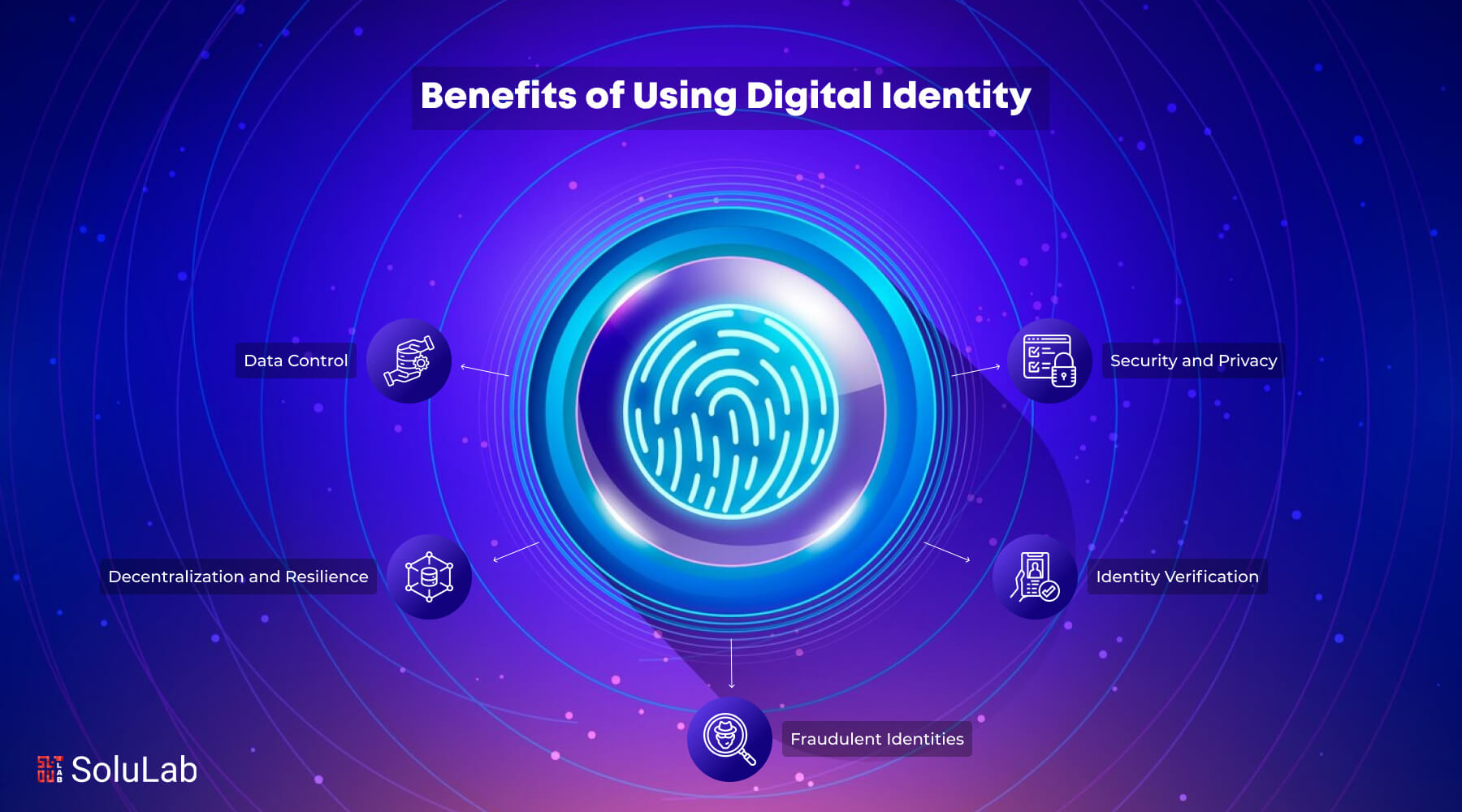
Blockchain digital identity has transformed the verification of our identities—securely, confidentially, and universally. By 2026, over 5.2 million digital ID wallets are anticipated, indicating a transition from conventional IDs to more intelligent, decentralized alternatives.
With digital identity verification in blockchain, users gain full ownership of their data and can share only what’s necessary, when it’s required. This shift is not just about convenience; it’s about building trust and transparency in digital interactions.
This article will examine the primary benefits of utilizing digital identification through blockchain, including improved privacy and expedited cross-border access. So let’s get started!
What is Blockchain Digital Identity, and Why is it Essential?
Before addressing fresh uses of identity management in blockchain, it is essential to determine the importance and benefits of digital identity. Why is the use of blockchain technology in digital identification causing concern? The concept of digital identity has grown extremely broad, resulting in the assumption that it only refers to publicly accessible personal information online. You’d be incorrect if you thought your digital identity was limited to your social media profiles, email addresses, and home address.
Digital identity displays a person’s finest actual and online personas. Your online presence, which includes images, purchase decisions, website usage trends, and bank account information, forms a part of your digital identity. However, discrepancies exist in how digital identity is displayed across numerous platforms, such as banking systems, social networking sites, and telecom networks.
The relevance of digital identity would be the basis for answering the question, “What is digital identity management in blockchain?” The customer onboarding process must be sped up while accuracy is guaranteed. Digital identity is also necessary for combating fraud and money laundering, which are inextricably linked. With digital identity management, government services to people may be streamlined and standardized.
The capability of social transformation projects and the assurance of economic advantages for diverse communities by citizen welfare measures highlight the need for blockchain and identity management. One such digital identification application example is Singapore’s Smart Nation plan’s National Digital Identification, or NDI, system. The NDI system would make citizens’ involvement in e-government services more secure.
Issues With the Current Identity Management System
The issue of digital identity remains significant. If it’s paper-based, like birth certificates stored in a town hall basement, it might be lost, subject to identity theft, or vulnerable to fraud. Digital identity management reduces bureaucracy and expedites business processes within enterprises by enabling improved interoperability between departments and other organizations. However, if this digital identity is stored in a centralized institution, it remains a target for hacking. Since 2017, almost 600 million pieces of personally identifiable data, including addresses and credit card details, have been stolen from companies.
The vast majority of current digital identity management solutions require improvement and modernization. Identity portability and verification are now feasible anywhere, at any time, thanks to digitization. But being digital alone is insufficient; identity needs to be secure and private. A comparison between Multi-Chain vs. Cross-Chain solutions can be crucial in determining the future of secure identity management, as both approaches offer different methods of data sharing and verification across multiple blockchain networks. Numerous sectors face challenges due to current digital identity management techniques, signaling a strong need for more advanced, decentralized solutions.
-
Government
The requirement for interoperability between departments and levels of governmental services leads to excessive bureaucracy. Overall process durations and costs lengthen as a result.
-
Healthcare
The majority of people on the planet do not have access to quality healthcare. The lack of interoperability across healthcare providers (hospitals, clinics, insurance firms, doctors, pharmacies, etc.) results in ineffective healthcare, delayed care, and unhappy patients.
Related: AI Agents in Healthcare
-
Education
It’s estimated that 200,000 fake academic degrees are peddled each year in the United States. Unqualified candidates are employed as a result of the challenges in verifying the validity of these credentials, which damages institutions’ and hiring companies’ reputations.
Read Our Blog: Role of AI in Education Industry
-
Banking
Users’ access to their bank accounts is less secure when login details like passwords are required.
-
Businesses in General
The requirement to preserve client and employee personal data breaches is a cause of corporate liability. Due to GDPR infringements, as in the British Airways case, or just as a result of a loss of customer confidence and associated brand harm, personal data breaches may result in significant penalties.
How Blockchain Digital Identity Acts As A Problem Solver?
Blockchain technology is demonstrating efficacy as a robust solution to worldwide identity issues. Blockchain for digital identity is revolutionizing the management and verification of identities for individuals and businesses through a decentralized, secure, and user-controlled framework.
- Eradicates Centralized Vulnerabilities: Conventional identification methods depend on central databases frequently targeted by cybercriminals. Blockchain and digital identity together mitigate this risk by disseminating data throughout a secure network, therefore diminishing single points of failure.
- Helps Users to Manage Their Data: Blockchain enables consumers to control access to their personal data, rather than having third parties own their identifying information. This guarantees confidentiality and selective dissemination.
- Provides Data Integrity: Each ID record maintained on a blockchain is time-stamped and impervious to tampering. Upon verification, it cannot be modified without consensus, hence maintaining elevated levels of confidence.
- Facilitates Cross-Border Verification: Decentralized systems enable universal identity verification across institutions and boundaries, making them suitable for global travel, finance, and digital services.
- Increases Access to Legal Identification: Millions lacking formal documentation may now establish digital identities on the blockchain, therefore addressing the worldwide identity disparity.
How Does Blockchain for Digital Identity Verification Work?
For an understanding of the benefits of blockchain-based identification systems, it is essential to understand their underlying mechanisms. The integration of cryptographic techniques, key management, and decentralized consensus guarantees the security, privacy, and tamper-resistance of digital identification.
- Immutable Records Using Hashing
Blockchain safeguards identification information using cryptographic hashes, which serve as unique digital identifiers for each data entry. Upon the addition of a user’s identification information to the network, it is converted into a static hash. Any alteration to this data modifies the hash, rendering illegal changes easily identifiable. This assures that digital identity verification in blockchain is reliable and impervious to manipulation.
- Secure Access Utilizing Public-Private Key Pairs
Every individual is allocated a distinct pair of keys: a public key (serving as a digital address) and a private key (used for access authorization). Access to identity data is restricted to individuals with the appropriate private key, hence guaranteeing safe and user-governed verification procedures.
- Decentralized Trust via Consensus
Blockchain networks utilize consensus techniques such as Proof of Stake or Proof of Authority to authenticate new entries. Upon submission of identification credentials, they are verified by many separate nodes. This decentralized approval mechanism obviates the necessity for central authority and secures the integrity of identification data throughout the network.
- Privacy by Design
Blockchain systems provide selective disclosure, allowing individuals to reveal only particular aspects of their identities. This mitigates data exposure, augments privacy, and facilitates adherence to data protection rules.
- Global Interoperability
In contrast to isolated conventional identity systems, blockchain IDs are transferable. Individuals may authenticate their credentials across several platforms and jurisdictions without redundant manual procedures, optimizing processes from onboarding to KYC.
Benefits of Using Digital Identity With Blockchain

With the advent of Bitcoin in 2008, blockchain technology arose, giving an efficient, transparent, and decentralized system distributed across a network of computers with the help of a blockchain development company. Have you ever imagined gaining complete control of your personal data and deciding how it is used? Managing and safeguarding your online identity is now a reality thanks to blockchain services. It has already altered areas such as finance, banking, healthcare, and insurance, and it is now set to redefine digital identity management.
Several significant benefits of using blockchain in identity management are listed below:
- User-Owned Identity
Blockchain digital identity enables individuals to be independent of centralized entities for the issuance or management of their personal credentials. Users dictate the timing, location, and recipients of their information, facilitating genuine data ownership.
- Tamper-Proof Verification
Identity data recorded on the blockchain is unalterable. Once included, it cannot be modified or removed without agreement, so rendering identity fraud, document tampering, and impersonation far more challenging to perpetrate.
- Faster and Frictionless Access
Blockchain-based IDs expedite verification processes for onboarding to banking applications, age verification for digital services, and applications for public benefits while removing delays associated with paperwork.
- Selective Disclosure for Privacy
Users may disclose just the essential data necessary for verification—such as validating age without disclosing a birthdate—thereby augmenting privacy and mitigating data leakage threats.
- Cross-Platform and Borderless Use
Digital identity on blockchain is transferable. It operates flawlessly across applications, platforms, and nations—perfect for travelers, expatriates, and international professionals requiring universal acknowledgment.
DO YOU KNOW?
The global blockchain market, valued at $3 billion in 2020, is projected to witness remarkable growth in the coming years. This market is anticipated to reach a staggering $39.7 billion by 2025.
- Cost Savings for Institutions
Organizations also get advantages by decreasing compliance expenses, removing middlemen, and automating verification procedures using smart contracts.
- Built-in Compliance Support
Blockchain identifiers may be structured to comply with KYC/AML rules, GDPR, and other international standards, facilitating audits and enhancing regulatory transparency.
How Blockchain Works in Online Verifiable Identity?

Blockchain technology has the potential to revolutionize online verifiable identity by providing a secure, transparent, and decentralized platform for managing digital identities. Here’s a step-by-step explanation of how blockchain works in online verifiable identity:
-
Decentralized Identifiers
Decentralized identifiers (DIDs) are used by blockchain-based identification systems to validate and securely share identities with verified parties. By ensuring openness, effectiveness, and tamper-proof administration of digital identities, these cryptographic keys do away with the need for several identity papers.
-
Distributed Ledger Technology
Each component of a blockchain has a significant function. DLT, or distributed ledger technology, offers security and openness. It serves as an impenetrable database that keeps track of all transactions and updates identification data.
-
Tokens
Tokens serve as identity representations in the digital realm. Without divulging all of your personal information, you may authenticate your identity using tokens. However, the capacity of the blockchain to encrypt and retain data immutably is a prerequisite for all of this.
-
Encryption
You are the only one with access to the data kept on a block since you are a registered user. Unless you add to the encrypted data, it will remain untouched. By doing so, you deter identity thieves and safeguard your personal information.
-
Immutability
A crucial characteristic of blockchain technology is immutability, where finished transactions are time-stamped, cryptographically signed, and consecutively added to the ledger. Without the consent of all parties involved, the records kept on the blockchain cannot be changed or distorted.
Blockchain systems are an effective tool because of the integration of DIDs and other crucial components. They assist in enhancing the blockchain ecosystem’s safety and confidentiality.
Conclusion
The future of identification is in decentralized, granting individuals total ownership over their data while ensuring that verification is rapid, safe, and impenetrable. Blockchain-based digital identification facilitates a revolutionary transition from antiquated, centralized systems to dynamic, user-centric frameworks that are global and designed for the digital era. This technology is establishing a more intelligent identity infrastructure for the future, encompassing safe onboarding, real-time verification, and privacy-centric sharing.
SoluLab specializes in developing scalable and secure identification systems customized for diverse sectors. As a reputable blockchain development company, we have enabled international clients with custom blockchain ecosystems that enhance identity management and regulatory compliance. Morpheus Network is a blockchain-based SaaS platform transforming the logistics sector through the integration of blockchain technology, IoT, and real-time communication technologies.
Ready to explore how blockchain can transform your identity systems or business infrastructure? Let us collaborate to create something exceptional!
FAQs
1. How does blockchain improve the security of digital identities?
Blockchain ensures that digital identity data is encrypted, time-stamped, and stored across a decentralized network. This structure makes it nearly impossible for unauthorized parties to alter or tamper with identity information, significantly reducing the risk of fraud or data breaches.
2. Can blockchain digital identities be used across different platforms and countries?
Yes, one of the major benefits of digital identity on blockchain is its portability. A verified blockchain ID can be used globally across various platforms, industries, and borders, making it ideal for cross-border transactions, digital services, and travel.
3. Is it possible to control what information I share through a blockchain-based identity?
Absolutely. Blockchain-based identity systems support selective disclosure, allowing users to share only the necessary information (e.g., verifying age without revealing full birthdate), enhancing privacy while still meeting verification requirements.
4. How does digital identity verification in blockchain help organizations?
Organizations can streamline onboarding, reduce verification costs, comply with regulatory requirements, and prevent identity fraud more effectively. Blockchain also automates trust through smart contracts, reducing the need for manual checks.
5. What industries benefit most from blockchain digital identity solutions?
While blockchain identity benefits nearly every sector, industries like finance, healthcare, logistics, education, and government services see the greatest impact due to their high demand for secure, efficient, and compliant identity management.






